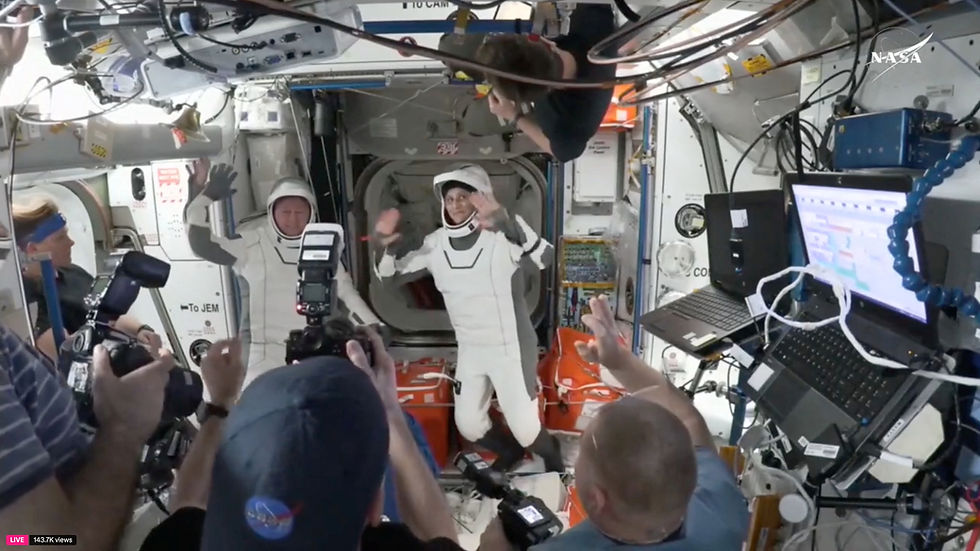Trump's $130,000 hush money payment and the path to his criminal trial
- News Agency
- Apr 16, 2024
- 3 min read

Donald Trump is set to face the first-ever criminal trial of a former U.S. president starting on Monday. The charges are tied to a $130,000 hush money payment made to buy a porn star's silence before the 2016 election about a sexual relationship she says she had with him.
Trump, who is again running for president, has pleaded not guilty to falsifying business records to cover up the payment. Below is a timeline of events leading up to the trial:
JANUARY 2018
The Wall Street Journal reports that Trump arranged the payment to porn star Stormy Daniels in October 2016 to prevent her from discussing the alleged 2006 sexual liaison. Trump married his third wife, Melania Trump, in 2005.
Trump has repeatedly denied having sex with Daniels, whose real name is Stephanie Clifford.
FEBRUARY 2018
Michael Cohen, a former private lawyer and fixer for Trump, says he paid Daniels using his own money and was not directed by Trump's company or campaign to make the payment. He said Trump never reimbursed him for the payment.
Cohen would later contradict both statements under oath, stating that Trump did, in fact, direct him to make the payment and reimbursed him.
FEBRUARY 2018
The New Yorker magazine reports that Trump had an affair with Playboy model Karen McDougal from 2006 to 2007. The magazine said American Media Inc, publisher of the National Enquirer tabloid, paid McDougal $150,000 for exclusive rights to her story shortly after Trump became the Republican nominee for president in 2016.
The National Enquirer never published the story.
APRIL 2018
Trump, asked by reporters if he knew about the payment to Daniels, responds, "No." Asked why Cohen made the payment, Trump said, "You'll have to ask Michael Cohen."
MAY 2018
In an ethics disclosure, Trump acknowledges reimbursing Cohen for the $130,000 paid to Daniels.
JULY 2018
Rudy Giuliani, one of Trump's personal lawyers at the time, says Cohen recorded a conversation with Trump two months before the 2016 election in which the two discussed a potential payment to McDougal. Trump denies wrongdoing and calls Cohen's tape "perhaps illegal."
AUGUST 2018
Cohen pleads guilty to criminal charges in federal court in Manhattan, including campaign finance violations over the hush money payments to Daniels and McDougal. He testifies that Trump directed him to make the payments "for the principal purpose of influencing the election."
In their indictment of Cohen, prosecutors say a candidate for federal office referred to as "Individual-1, whom they later confirmed was Trump, arranged the payments. Federal prosecutors did not charge Trump with a crime.
DECEMBER 2018
Trump calls the hush money payments a "simple private transaction." In an interview with Reuters, he says the payment to Daniels "wasn't a campaign contribution" and "there was no violation based on what we did."
JULY 2021
Cyrus Vance, the Manhattan district attorney at the time, charges Trump's New York-based family real estate company, the Trump Organization, and its top financial executive with tax fraud. Trump himself is not charged, and the indictment contains no references to hush money payments.
DECEMBER 2022
The Trump Organization is found guilty of tax fraud after a trial in New York state court in Manhattan.
JANUARY 2023
Vance's successor as Manhattan district attorney, Alvin Bragg, begins presenting evidence about Trump's alleged role in the 2016 hush money payments to a grand jury.
MARCH 2023
Bragg's office says Trump has been indicted. The specific charges remain under seal.
APRIL 2023
The indictment is unsealed. It charges Trump with falsely claiming in records held by the Trump Organization that his 2017 reimbursements to Cohen for the Daniels payment were legal expenses.
Prosecutors say the fabricated records were designed to conceal the Daniels and McDougal payments, which they characterized as a scheme to corrupt the 2016 election. Trump wins the presidency that year, defeating Hillary Clinton, a Democrat.
Trump pleads not guilty to the charges and later tells supporters gathered outside his home in Florida that he was the victim of "election interference," without providing evidence.
FEBRUARY 2024
Merchan denies Trump's request to dismiss the charges.
APRIL 15, 2024
Jury selection is slated to begin for Trump's trial, which is expected to last between six and eight weeks.
(Reporting by Luc Cohen in New York; Editing by Noeleen Walder and Jonathan Oatis)









.png)








Comments